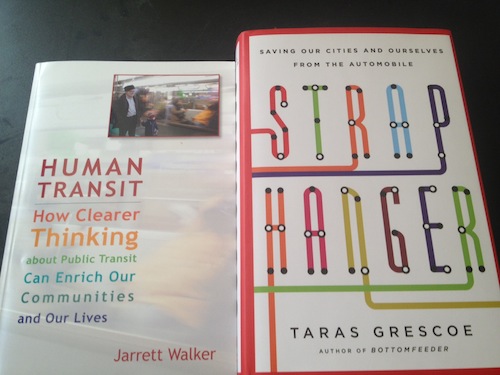Reading: Human Transit by Jarrett Walker & Straphanger by Taras Grescoe
Two books arrived recently, both on transit, specifically now how transit can improve our lives: Human Transit: How Clearer Thinking about Public Transit Can Enrich Our Communities and Our Lives by Jarrett Walker and Straphanger: Saving Our Cities and Ourselves from the Automobile by Taras Grescoe. Given that I’d sold my car over a month ago both books piqued peaked my interest.

Human Transit: How Clearer Thinking about Public Transit Can Enrich Our Communities and Our Lives:
Walker takes complicated and often technical subjects and presents them to the reader in layman’s terms.
The table of contents shows the topics covered:
- What Transit is, and Does
- What Makes Transit Useful? Seven Demands and How Transit Serves Them
- Five Paths to Confusion
- Lines, Loops, and Longing
- Touching the City: Stops and Stations
- Peak or All Day?
- Frequency is Freedom
- The Obstacle Course: Speed, Delay, and Reliability
- Density Distractions
- Ridership or Coverage: The Challenge of Service Allocation
- Can Fares be Fair?
- Connections or Complexity?
- From Connections to Networks, to Places
- Be on the Way! Transit Implications of Location Choice
- On the Boulevard
- Take the Long View
Walker doesn’t offer the solutions, he asks the questions to get us to determine what we need from our transit system:
This book aims to give you a grasp of how transit works as an urban mobility tool and how it fits into the larger challenge of urban transportation. This is not a course designed to make you a qualified transit planner, though some professionals will benefit from it. My goal is simply to give you the confidence to form and advocate clear opinions about what kind of transit you want and how that can help create the kind of city you want.
I can tell this book will be a valuable resource for me. Read the blog here and purchase here ($35 softcover)
Straphanger: Saving Our Cities and Ourselves from the Automobile
Grescoe takes a different, but valuable, approach to transit. Examples from numerous cities in North America and the entire world are examined.
Taras Grescoe rides the rails all over the world and makes an elegant and impassioned case for the imminent end of car culture and the coming transportation revolution
“I am proud to call myself a straphanger,” writes Taras Grescoe. The perception of public transportation in America is often unflattering—a squalid last resort for those with one too many drunk-driving charges, too poor to afford insurance, or too decrepit to get behind the wheel of a car. Indeed, a century of auto-centric culture and city planning has left most of the country with public transportation that is underfunded, ill maintained, and ill conceived. But as the demand for petroleum is fast outpacing the world’s supply, a revolution in transportation is under way.
Grescoe explores the ascendance of the straphangers—the growing number of people who rely on public transportation to go about the business of their daily lives. On a journey that takes him around the world—from New York to Moscow, Paris, Copenhagen, Tokyo, Bogotá, Phoenix, Portland, Vancouver, and Philadelphia—Grescoe profiles public transportation here and abroad, highlighting the people and ideas that may help undo the damage that car-centric planning has done to our cities and create convenient, affordable, and sustainable urban transportation—and better city living—for all. (MacMillan)
Not sure yet how lessons learned in other cities will apply to St. Louis but such knowledge is important to quality solutions.
Final thoughts
Both books reference a quote commonly attributed to Margaret Thatcher: “A man who, beyond the age of 26, finds himself on a bus can count himself as a failure.”
It appears that the quote was misattributed to Thatcher:
Attributed to her in Commons debates, 2003-07-02, column 407 and Commons debates, 2004-06-15 column 697. According to a letter to the Daily Telegraph by Alistair Cooke on 2 November 2006, this sentiment originated with Loelia Ponsonby, one of the wives of 2nd Duke of Westminster who said “Anybody seen in a bus over the age of 30 has been a failure in life”. In a letter published the next day, also in the Daily Telegraph, Hugo Vickers claims Loelia Ponsonby admitted to him that she had borrowed it from Brian Howard. There is no solid evidence that Margaret Thatcher ever quoted this statement with approval, or indeed shared the sentiment. (Wikiquote)
Who spoke the words isn’t as important as the general agreement of much of the world with this view.
I’m glad to have these two books in my library.
– Steve Patterson
Thanks for the info! I need to get a copy of Human Transit – he seems to be articulating many of the same points that I’ve been trying to make, especially when it comes to transit here, in St. Louis. Straphanger sounds more like a book that’s “preaching to the choir”, a wonk talking to wonks and taking a condescending attitude toward everyone else who “doesn’t get it”.
…both books *piqued* your interest.
http://languageandgrammar.com/2008/07/29/has-your-curiosity-been-peaked-or-piqued/
Thanks!
For those with limited funds, Straphanger is available at the St Louis Public LIbrary
wow I read the exact pair of books last month!